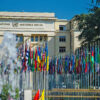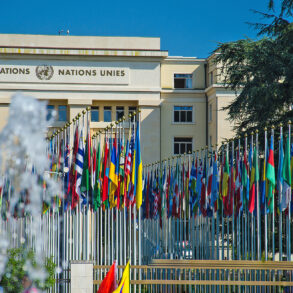One of the greatest psychoanalysts, Jacques Lacan, has a triad of the human being. They are the imaginary, the real and the symbolic. The real is so pure and abstract that concepts cannot explain it. The imaginary is how we see ourselves – our relationship with our imagined selves. And we hold hold on to our imagined self intensely. And the symbolic is how we participate with others. And the symbolic order is the composite sum of how people reach with each other in a society.
For example, when someone from London says to you, ‘you should come for dinner sometimes.’ It is not a clear invitation. It is rather polite talk. Or when a waiter says, ‘How are you?’ You are expected to simply say ‘fine’ and move on. The asker is not asking you to burst in tears sobbing about your insomnia. As my teacher said, ‘in Cape Town, when they say inshallah. What they really mean is ‘forget about it.’
These rules which issue out from the symbolic order are necessary so that people can go about their day efficiently. The symbolic order sustains the rules that we must abide by if we are to be effective participants of the world. More importantly, Lacan argues, the symbolic order shapes the imagined view of ourselves. However, when the symbolic order is corrupted, it can make people have an unhealthy view upon themselves.
For example, Aristotle argued that the purpose of life is happiness. The word he chose to use is eudomonia, which means pure spirit or good spirit. Aristotle saw this as being so essential that is seminal work – the Nicomechean Ethics – teaches us how to achieve it. For centuries thereafter both Christendom and the Muslim world accepted Aristotle’s teaching and they tried to impart it through the mechanisms of their respective civilisations – the legal, the economic and the spiritual.
In the 18th century, Jefferson added to the American Declaration of Independence that the essential right which the American government will guarantee will be ‘life, liberty and the persuit of happiness.’ This pursuit of happiness was modified by Founding Fathers to mean economic freedom that they thought the British Empire was interfering with. Later, President Herbert Hoover said to a group of businessmen: ‘You have transformed people into constantly moving happiness machines that they have become key to economic progress.’
Thus, capitalism eventually warped Aristotle’s original understanding that happiness is the most essential desire for mankind. Thus, the symbolic order held by the ancients was disregarded as humanity dawned modernity. Thenceforth, man no longer saw himself as a spiritual being but only as a consumer which is a perversion.
We will demonstrate once again how a change in the symbol order can affect individuals. In the 17th century, Charles I’s lost a civil war against the nobility and was subsequently put on trial for treason. Charles argued that it is not possible that he would act in treason against himself. So the nobles changed the symbolic order by separating the Monarch from the idea of country. So they said that he wasn’t acting against himself but against himself but against England. So, they chopped off his head. They replaced him with the pliant William of Orange who would be powerless. The trend from the English Revolution of 1642 to the Russian revolution of 1905 was the rise of the middle class. Will Durant summarised the situation:
‘It was the bankers, the merchants and the manufacturers who aroused, financed and tamed the French Revolution; they who overthrew the hold of the Tory landowners upon young America in 1776; they who, in 1832, upset the ancient aristocracy of England and made themselves, inch by inch, supreme lords of the British Empire and its destiny.
(History of Western Civilisation Vol2, Barnes p. 17)
In other words, the nobles of England defanged the monarchy after the English Civil War and set it up only as a powerless symbol whilst power remained firmly in their hands through their institution – Parliament. As time went on, the capitalists managed to subvert parliament to its own will by encasing it within the ambit of their institutions – the Bank of England and overtime the World Economic Forum and the like. As a result, they set up two symbols – two veils – to hide their power behind. The first veil, everyone knows that the Monarchy is a ceremonial institution sapped of any power. The second veil is the illusion of Parliament as an institution that acts for England.
Since Occupy Wall Street more than a decade ago, the masses know that the bankers ultimately run the show offstage. However, they remain passionate consumers of the political theatre. Passionate responses to certain Prime Ministers taking office is one such example. And of course, the recent death of Queen Elizabeth II is another such case. We acknowledge that these figures and the offices they are being inaugurated in are not to champion our interests, but the interests of the unelected and hidden elite. Yet, we are hypnotized by this symbolic order. Furthermore, this hypnosis has an effect on how we see ourselves.
Our consumer society puts forward the idea that there more products and services one consumes, the more one is happy. And indeed man now sees himself as a consumer. We value luxury handbags because they signal our aspiration to being wealthy. We value Apple Computers, not necessarily for their utility, but because they signal to ourselves that we are non-conformists. We value a Land Rover truck because it tells a narrative of authenticity. In our consumer society, the consumption of goods and services functions to cement and consolodate the ground upon which the illusions of our self-image rest. And that self-image, in turn, strengthens the adhesive of the symbolic order.
As a result of this social stasis, the Political class have enacted laws which are designed to give bankers more and more power such as the Gramm-leach-Billey Act of 1999 which demolished remaing barriers between commercial and investment banking. The Commodity Futures Modernisation Act of 2000 which prohibited Federal regulation of over the counter (O.T.C) derivatives.
If anyone dares to ask what is going on, is confronted by veils upon veils encoded in language they can scarcely pierce through: high—yield debt, securitization, arbitrage trading, derivatives, credit default swap, interest rate swap.
Thus we are left with a populace that feels at the deepest parts of their being that its their responsibility to act. However, the symbolic order presents us with veils and illusions which suggest that we cannot possibly do anything to help the siuation. At its most imbedded, the symbolic order can convince one that liberal democracy is the best that humanity can achieve. And that only the lazy are destiny to sink to the bottom of poverty and the rich will rise.
– II –
‘It is always interesting’, noted D.H. Lawrence, ‘to see the original self in man being modified by a big universal idea. One must recover the original self now.’ The psychoanalysts, Jacques Lacan, argued that the symbolic order molds the image of ourselves. Lacan also argued that the human being has, within him, a third element of the which he calls the Real. Lacan also argued that mankind is afraid of the Real. However, some people want more than the symbolic. Shaykh Abdalqadir as-Sufi says: ‘It is for these reasons that modern man must dig deep into himself to see if, after the almost complete conditioning to which he has been submitted, he is able to act at all. The result of a secular liberal education is something akin, socially, to the general paralysis of the insane. However, there are still those who will not accept the role allotted to them by the oligarchy of banking – to be helpless and happy members of the faceless consumer mob.’
The Real is similar to what Sufis call Ruh. Shaykh Muhammad ibn al-Habib says in his Diwan,
‘My Ruh speaks to me and says: ‘My reality is the light of Allah, so do not see other-than-Him. If I were not a light I would be other-than-Him, indeed otherness is nothingness, so do not be content with it.’
In book 21 of the Ihya, Imam al-Ghazali wrote,
‘The heart is that which, if a man knows it, knows himself. And if he knows himself, he knows his Lord.’
The rediscovery of the Real in Lacanian terms or Ruh/ the Adamic face in Sufic terminology is the part of ourselves that we must rediscover. However, Lacan said that we fear to reunite with the Real. And Shaykh Ahmad ibn ‘Ajiba also said that this rediscovery is a ‘field of heroes, they do not belong to any vain coward.’
We fear the Real because by encountering it, it will rent asunder the symbolic order and the autobiography we have written for ourselves as mere consumers, powerless to help change our very existence. Once the individual has rediscovered him original face he will discover that he is an intime creature with an out-time contract.
– III –
In the 1973 Bruce Lee movie Enter the Dragon, we may find an elucidation on how to go beyond our current social stasis. In the movie, Bruce Lee’s character – Lee – goes to investigate a wealthy businessman named Han, who is involved in sex trafficking and drugs smuggling. During the climax of the film, Lee confronts Han in his hall of mirrors. Confused by the optical illusions, Hans has the clear advantage.
It is during those moments that Lee remembers the words of his teacher – Shaolin Abbott, ‘Now you must remember that the enemy has only images and illusions behind which he hides his true motives. Destroy the image and you will break the enemy.’ Thence-after, Lee illuminates the illusions around him in order to confront Han and defeat him.
The symbolic order has given us a false image of ourselves. Resultantly, we are impotised, unmanned, emasculated, eunuched to submission. From being Representatives of Allah, to being mere consumers, we have been tricked! Yet what we see around us is macabre – the people are oppressed and tyrannized – they are unfed, unhoused and uneducated. The environment itself is on the brink of collapse – the oceans are being poisoned, the earth stripped bare of its faun and flora and the air gets ever more toxic by the hour.
Allah, subhana wa ta’ala, said in his holy book saying that all of creation is a sign. That means that cognition is the receiving and decoding of signs. ‘In the heavens and the earth are signs for the acceptors.’ The sign is not a thing. The sign is there to be understood. A sign could be understood as an object and at the same time, as containing meaning. Liberal education has sapped meaning from an object. Man must once again go out to the world and read its inward and outward qualities. For that will reveal to him that he is an intime creature with an out-time contract.
The death of Queen Elizabeth has erupted a lot of emotions from Muslims across the world. These passionate responses to a ceremonial monarchy have been stripped of all power for 373 years is worrying. It indicates that we are fascinated with the symbolic order and not with the real. In other words, our fascination with the symbolic order reflects our fascination with our self-image – not our original Adamic face.
To crash through the symbol and arrive at the Real, the Prophet Muhammad, peace be upon him, gave us an antidote when he said, ‘O Allah, enable me to see the truth as truth and give me the ability to follow it, and enable me to see falsehood as false and give me the ability to refrain from it.’











